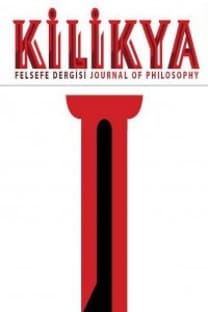Martin Heidegger'in Teknoloji Görüşü: Özcü Eleştiriye Bir Cevap
Martin Heidegger, özellikle çok tartışılan “Teknolojiye İlişkin bir Soru” makalesiyle modern dönemde teknolojinin durumuyla ilgili tartışmaları etkileyen en önemli filozoflardan biridir. Ancak, onun teknoloji görüşleri çeşitli şekillerde yorumlanmıştır. Andrew Feenberg ve Don Ihde, Heidegger’i, özcü olmakla suçlarlar. Feenberg, ayrıca da Heidegger’in teknolojik determinist ve güçlü anlamda pesimist olduğunu ima eder. Diğer yandan, Iain Thomson, Heidegger’in teknoloji görüşünün geleneksel anlamda özcü olmadığını iddia eder. David Edward Tabachnick’de, Heidegger’de özcülüğün, determinizmi içermediğinin altını çizer. Bu makalede, Feenberg’in özcü suçlamasına karşı Heidegger’i savunacağım. İlk olarak, Feenberg’in Heidegger yorumunu özetleyeceğim. İkinci olarak, Heidegger’e karşı suçlamalarının temelsiz olduğunu göstermek için Feenberg’i eleştireceğim.
Anahtar Kelimeler:
Martin Heidegger, teknoloji, Andrew Feenberg, özcülük, teknolojik determinizm, teknoloji-karşıtlığı, teknolojinin özerkliği
Martin Heidegger on Technology: A Response to Essentialist Charge
Martin Heidegger is one of the major philosophers influencing discussions of the condition of technology in the modern era especially with his very much debated article, “The Question Concerning Technology.” However, his views of technology are variously interpreted. Andrew Feenberg and Don Ihde accuse Martin Heidegger of being “essentialist.” Feenberg also implies that Heidegger is a technological determinist and a strong pessimist. On the other hand, Iain Thomson asserts that Heidegger’s view of technology is not essentialist in the traditional sense. David Edward Tabachnick also underlines that essentialism in Heidegger does not necessarily include determinism. In this article, I defend Heidegger against Feenberg’s essentialist charge. First, I summarize Feenberg’s interpretation of Heidegger. Secondly, I criticize Feenberg to show that his accusations against Heidegger are unjustified.
Keywords:
Martin Heidegger, technology, Andrew Feenberg, essentialism, technological determinism, anti-technology, autonomy of technology,
___
- Dreyfus, Hubert. (1995). Heidegger on Gaining a Free Relation to Technology. In A. F. Editor & A.H. Editor Technology and the Politics of Knowledge (128-145). Bloomington: Indiana University Press.
- Dusek, Val. (2006). Philosophy of Technology: An Introduction. Oxford: Blackwell Publishing.
- Feenberg, Andrew. (1999). Questioning Technology. New York: Routledge.
- Heidegger, Martin. (1977). The Question Concerning Technology and Other Essays. New York: Harper Torchbooks.
- Heidegger, Martin. (2006). Pathmarks (7th Edition). (William McNeill, Ed&Trans), Cambridge: Cambridge University Press.
- Heidegger, Martin. (1966). Discourse on Thinking. (Anderson, M. John & Freund, Hans Trans). New York: Harper Torchbooks.
- Heidegger, Martin. (1971) Poetry, Language and Thought. (Albert Hofstadter, Trans) New York: Harper and Row Publishers.
- Ihde, Don. (2010). Heidegger on Technology: One Size Fits All. Philosophy Today, 54, 101-105
- Tabachnick, David Edward. (2007) Heidegger’s Essentialist Responses to the Challenge of Technology. Canadian Journal of Political Science, 40:2, 487-505
- Thomson, Iain. (2000). What’s Wrong with Being a Technological Essentialist? A Response to Feenberg. Inquiry, 43:4, 429-44
- Thomson, Iain. (2000 a). From the Question Concerning Technology to the Quest for a Democratic Technology: Heidegger, Marcuse, Feenberg. Inquiry, 43:2, 203-215
- Yayın Aralığı: Yılda 2 Sayı
- Başlangıç: 2014
- Yayıncı: Eray Yağanak
Sayıdaki Diğer Makaleler
Stalnaker’s Hypothesis: A Critical Examination of Hájek’s Counter Argument
Değer Çatışmaları Sorununda Bir Olanak: Duyguların Eğitimi
Platon ve Heidegger’de Aletheia ve Sanat Yapıtı İlişkisi
John Locke’ta Sözcüklerin Kurulumundan Toplumun Kurulumuna Uzlaşım Unsurunun Rolü
Martin Heidegger'in Teknoloji Görüşü: Özcü Eleştiriye Bir Cevap
